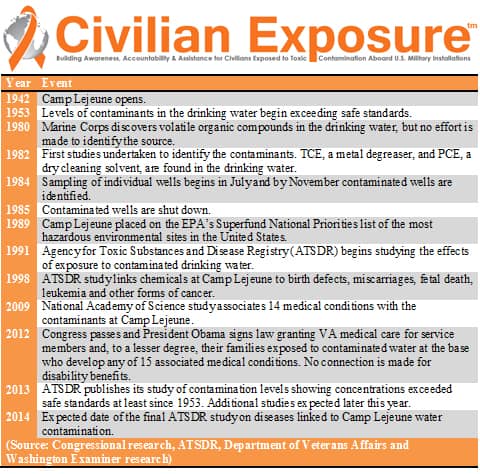 As you continue to familiarize yourself with contamination at bases across the country, you’ll begin to uncover the complexities involved in fighting for accountability in the courts. Specifically, the Camp Lejeune water contamination legal case involves several angles to consider and the legalese can get confusing. In this brief article, we wanted to shed some light on the legal issues and laws involved as well as put together the bigger picture in a digestible way.
As you continue to familiarize yourself with contamination at bases across the country, you’ll begin to uncover the complexities involved in fighting for accountability in the courts. Specifically, the Camp Lejeune water contamination legal case involves several angles to consider and the legalese can get confusing. In this brief article, we wanted to shed some light on the legal issues and laws involved as well as put together the bigger picture in a digestible way.
CERCLA:
The Comprehensive Environmental Response, Compensation, and Liability Act (CERCLA), commonly known as Superfund, was enacted by Congress on December 11, 1980. CERCLA:
- established prohibitions and requirements concerning closed and abandoned hazardous waste sites;
- provided for liability of persons responsible for releases of hazardous waste at these sites; and
- established a trust fund to provide for cleanup when no responsible party could be identified.
The law authorizes two kinds of response actions:
- Short-term removals, where actions may be taken to address releases or threatened releases requiring prompt response.
- Long-term remedial response actions, that permanently and significantly reduce the dangers associated with releases or threats of releases of hazardous substances that are serious, but not immediately life threatening. These actions can be conducted only at sites listed on EPA’s National Priorities List (NPL). Note: Of the over 100+ military installations currently listed on the EPA NPL, Camp Lejeune is perhaps among the largest.
This short-form community guide from the EPA helps make sense of CERCLA, or the Superfund: EPA Brochure – This is Superfund
The entire CERCLA law (250+ pages) is embodied in U.S. House of Representatives U.S. Code – Title 42, Chapter 103
FTCA:
Since its enactment in 1946, the Federal Tort Claims Act (FTCA) has been the legal mechanism for compensating people who have suffered personal injury by the negligent or wrongful action of employees of the U.S. government.
Individuals who are injured or whose property is damaged by the wrongful or negligent act of a federal employee acting in the scope of his or her official duties may file a claim with the government for reimbursement for that injury or damage. In order to state a valid claim, the claimant must demonstrate that (1) he was injured or his property was damaged by a federal government employee; (2) the employee was acting within the scope of his official duties; (3) the employee was acting negligently or wrongfully; and (4) the negligent or wrongful act proximately caused the injury or damage of which he complains. The claimant must also provide documentation establishing that his claim satisfies all the elements of the FTCA. (Source: US House)
Here are some general guidelines regarding the limitations on FTCA claims:
-
Only federal employees can be sued under the FTCA, not independent contractors hired by the federal government (unless they are treated like employees).
-
The negligent or wrongful conduct must have been done within the scope of the defendant’s employment.
-
In general, only claims of negligence — as opposed to intentional misconduct — are allowed (though some claims for intentional misconduct can be brought against certain federal law enforcement officers).
-
The claim must be based on — and permitted by — the law of the state in which the misconduct occurred. (Source: NOLO)
NC Statute of Repose:
SUBCHAPTER II. LIMITATIONS. Article 3. Limitations, General Provisions.
§ 1-15.1. Statutes of limitation and repose for civil actions seeking to recover damages
arising out of a criminal act.(a) Notwithstanding any other provision of law, if a defendant is convicted of a criminal offense and is ordered by the court to pay restitution or restitution is imposed as a condition of probation, special probation, work release, or parole, then all applicable statutes of limitation and statutes of repose, except as established herein, are tolled for the period set forth in this subsection for purposes of any civil action brought by an aggrieved party against that defendant for damages arising out of the offense for which the defendant was convicted. Any statute of limitation or repose applicable in the civil action shall be tolled from the time of entry of the court order (1) Requiring that restitution be made, (2) Making restitution a condition of probation or special probation, or (3) Recommending that restitution be made a condition of work release or parole, and until the defendant has paid in full the amount of restitution ordered or imposed. Except as provided in G.S. 15B-34, an action to recover damages arising out of the criminal offense shall not be commenced more than 10 years from the last act of the defendant giving rise to the cause of action.
(b) In any civil action brought by an aggrieved party against the defendant for damages arising out of the offense for which the defendant was convicted: (1) The defendant has the right to contest the amount of damages; (2) The amount of any restitution ordered or imposed shall not be admissible into evidence; and (3) All restitution paid by the defendant to the aggrieved party shall be credited against any judgment rendered in the action against that defendant.
(c) This section shall not apply if the offense of which the defendant was convicted was an offense established in Chapter 20 of the General Statutes.
(d) A plea of no contest shall be considered the same as a conviction for purposes of this section.
(1989, c. 535, s. 1; 2004-159, s.3.)
Putting it all together:
In general, military personnel cannot sue the federal government under the Feres Doctrine. However, CERCLA permits litigation in circumstances regarding harm from contamination. In the case of Camp Lejeune groundwater contamination, many will file claims with the government for wrongful death/negligence. If those claims are denied or otherwise go unanswered after a certain period of time, citizens are allowed to pursue legal action. In doing so, the presumption on the part of the plaintiff is that CERCLA preempts all as a federal law. Unfortunately, there’s one snag. If you reread the last bullet under CERCLA above, you’ll note the following:
The claim must be based on — and permitted by — the law of the state in which the misconduct occurred.
After the 2012 Camp Lejeune law was signed by President Obama, his DOJ attorneys swiftly went to court and fought to block all lawsuits by asserting that state law does not allow any of the cases due to the limitations found in the statute of repose. Those filing suit responded by asserting that the intention of CERCLA is to preempt any state limitations on legal remedies in these cases. The government responded with the claim that, essentially, the statute of repose is different than a standard statute of limitations. Given it’s 10-year limitation, the government attorneys argued that CERCLA did not apply because claims are not permitted based on state law (statute of repose).
 Shortly thereafter, NC legislators passed a law to amend the statute of repose to correct this issue. The Circuit Court of Appeals pointed out that the new legislation was useless as it could not apply retroactively and, again, stood with the ruling in favor of the government. Efforts are currently in progress to urge the court to reconsider hearing the case on the grounds that the government covered up the contamination for years and has constantly failed to notify all affected in a timely manner.
Shortly thereafter, NC legislators passed a law to amend the statute of repose to correct this issue. The Circuit Court of Appeals pointed out that the new legislation was useless as it could not apply retroactively and, again, stood with the ruling in favor of the government. Efforts are currently in progress to urge the court to reconsider hearing the case on the grounds that the government covered up the contamination for years and has constantly failed to notify all affected in a timely manner.
Why would the US Congress pass a law and Obama eagerly sign it, then turn around and have DOJ attorneys block legal recourse?
Simple: Money.
Providing free healthcare from 2012 onward for a select few hundred servicemen/veterans (those that are fortunate enough to weave their way through the absurdly complex obstacle course of supposed subject matter experts and the general red-tape runaround that is the VA claims process) is a lot cheaper. The government also doesn’t have to pay one dime or offer any services for civilians, children and others impacted. Zero cost. All they have to do is point to the patchwork of laws they’ve used to their favor and simply say “our hands are tied.”
The icing on the cake? The government also does not have to pay out billions in legal claims or reimbursements for the past 30 years of health costs and losses for up to 1 million people affected at the base. If such precedent were allowed for Lejeune, given the extent of military base contamination around the country, imagine how the costs would increase exponentially!
They know this. The motivation is not to do what’s right or just, but simply to save money through mitigation of legal risk. That’s right. It’s your government at work, folks, but not for you. What do you intend to do about it?

- Note: In 2014, ATSDR released several studies, summarized here.
Click to Subscribe to the Civilian Exposure Newsletter for Latest News & Updates Today!


5 comments
Do you have any information concerning the Federal Register comments concerning contamination at Camp Lejeune? Your information on-line is very good.
Your help is appreciated.
While living at Camp Lejeune my mother said, I was part of a study group as a child because of my learning problems this was in the early 60s and mid 70s and still live with these problems to this day.
I’m sure there will never be any compensation for my problems by this Government !
[…] Basic Legal Facts and Terminology on Lejeune Water Contamination […]
Simply put…..the general population (not just our govt. – govt represents the people) does not want their tax dollars spent on “doing the right thing.” They vote for those who wisely spend their money / money which works better for “they” as a whole. Things such as a new swimming pools at the high schools, after school programs, the arts, roads, etc. It matters not to them of the pain and suffering we acquired as a result of serving our country on bases which were a toxic wasteland. Essentially, my family does not matter. They would prefer we die off and have all this go away. They claim “no responsibility” and hide behind legal loopholes so they don’t have to compensate us for diseases like the one I acquired which is bladder cancer. The incontinence shouldn’t make anyone feel ashamed either right? How about the kidney stones, fatty liver disease, and spots all over my kidneys? It doesn’t matter that I am only 49 with kids. I get it….it’s for the greater good. I don’t have to like it. See you on the other side – I will save you a seat – if you deserve one. Your votes and voices matter.
While I don’t disagree entirely with your comment, I will say that the general population probably thinks this issue is just some small thing, limited to some small community somewhere removed from them. Quite the contrary. When you count up the number of bases around the country that have toxicity issues, and then do rough calculations on the potential amount of people exposed, you could easily say that 1 out of every 3 Americans nationwide may be potentially exposed to some sort of toxicity issue because of proximity to a polluted base. Once the general population wakes up to this fact and the immediacy of that impact, then there will be change.
I am saddened to hear about your health issues derived from this mess. But you are certainly not alone. Your family does matter. You matter. Protecting everyone from negligent chemical exposure and what I have dubbed the “generational health catastrophe” of military pollution should absolutely matter to the population, and to our “greater good”. Hang in there. The only constant in life is change, and I still believe that positive change will come with our continued pursuit of it. – GS